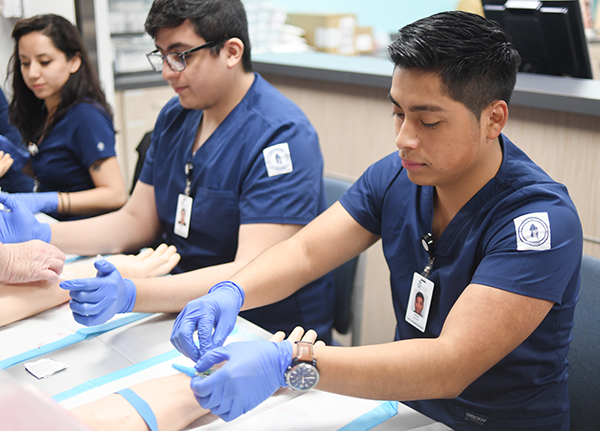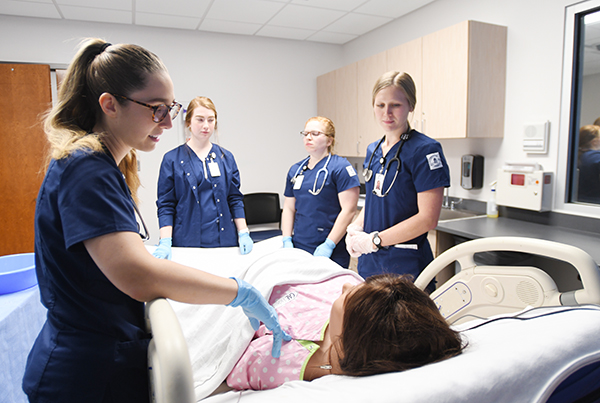News
Dalton State Nursing Program Expands to Meet Healthcare Needs
02/04/20
 Changes to Dalton State’s nursing program will mean more graduates each year to help meet workforce needs.
Changes to Dalton State’s nursing program will mean more graduates each year to help meet workforce needs.
“The changes are an attempt to better prepare students for the workforce and make sure we’re graduating students for our area healthcare facilities, which need nurses,” said Dr. Gina Kertulis-Tartar, dean of the School of Health Professions.
The Associate of Science in Nursing (ASN) program will offer two cohorts per year beginning fall semester, increasing the number of students on the path to become a registered nurse (RN) annually by 15.
The licensed practical nursing (LPN) certificate program decreased from a 16-month program to a 12-month program while still retaining the same requirements. This allows graduates to complete the program and obtain jobs more quickly. The LPN program has two cohorts per year.
“The LPN program is intense,” Kertulis-Tartar said. “We didn’t decrease the number of credits needed to complete the program, just the amount of time you spend in the program. They still have the Georgia Board of Nursing required number of hours of clinical time and skills labs, and they take some of the same courses an ASN student takes.”
The changes will also make it easier for a student to transition from the LPN program to the ASN program, and they can receive credit for classes taken as an LPN student.
Since the ASN and LPN programs now align better, students not accepted into the ASN program can enter the LPN program without a gap in enrollment. Enrolling in the LPN program increases the chance for acceptance into the ASN program.
 “Our ASN and LPN programs are not designed to weed students out, but to help them succeed and graduate,” said Dr. Sylvia Driver, chair of the Nursing Department and professor of nursing. “Our selection process is tough, but we help students work toward the program of their choice.”
“Our ASN and LPN programs are not designed to weed students out, but to help them succeed and graduate,” said Dr. Sylvia Driver, chair of the Nursing Department and professor of nursing. “Our selection process is tough, but we help students work toward the program of their choice.”
The ASN graduation rate for the cohort that began in fall 2017 and graduated last spring is 83%, while the NCLEX pass rate for first-time test takers is 91%. The NCLEX-PN pass rate, for LPNs, is 94.5%.
“I am proud of our retention and graduation rates in all our programs, as well as our NCLEX pass rate for our ASN and LPN,” Driver said. “I am a site visitor for a national accrediting body for other schools’ programs, and they do not all have the high retention and graduation rates we do. Our faculty and staff, and the way our program is designed, supports and helps our students succeed. We are not preparing students for a job. We’re preparing them for a career.”
The nursing program teaches students not only the technical skills needed to work in the healthcare industry, but the soft skills for communicating effectively with patients and colleagues. A simulation lab with responsive mannequins allows students to learn and make mistakes in a safe, supportive environment before working directly with a patient.
Approximately 200 students apply for the ASN program each year. Enrollment is capped at 80 because there are limits by both the state and healthcare facilities where students perform clinical hours. Classrooms can have one faculty member for every 20 students; however, clinical settings must have one faculty member for every six or eight students, depending on the area of medicine. Dalton State nursing students are in hospitals spanning from Atlanta to Chattanooga for clinicals.
“We would love to accept more students into our program, but we are limited by space,” Driver said. “Our facilities are choked with nursing students from several institutions, not just Dalton State. We’re all working to meet workforce needs.”
Healthcare facilities want more nurses with a Bachelor of Science in Nursing (BSN). Dalton State offers an RN to BSN program that is completed online. The BSN cohort that began fall 2018 and graduated last spring had a graduation rate of 100%.
“What we’re working really hard on is making sure students have an option with what degree they want to pursue, but whatever they do, we create the opportunity to go all the way to a BSN and graduate school,” Driver said.
Also planned for the nursing program is the addition of an LPN and paramedic bridge program track into the ASN. This will give professionals credit for the information they already know from on the job experience and make their path to an RN more seamless.
